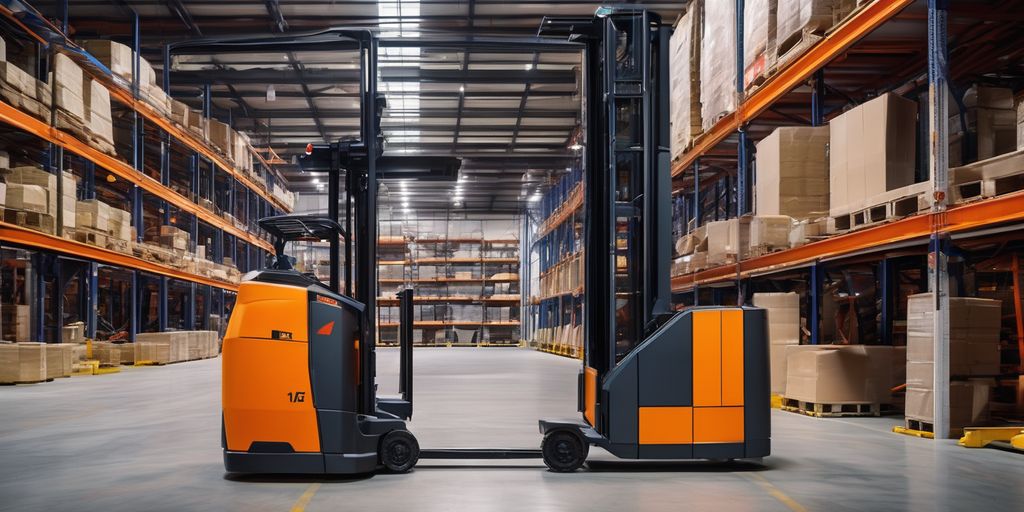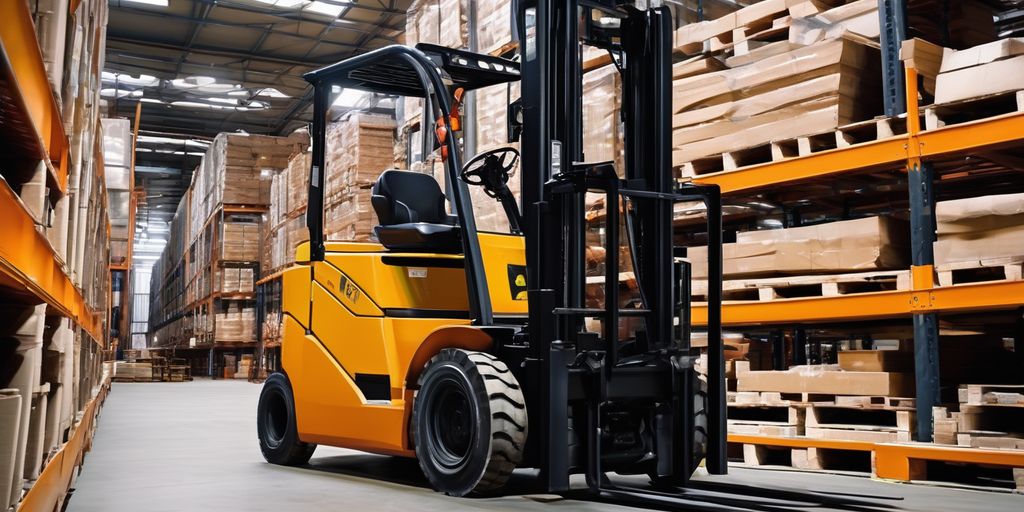Forklift maintenance is a cornerstone of efficient and safe industrial operations. Regular upkeep not only prevents unexpected breakdowns but also extends the lifespan of your equipment, ensuring that your forklifts are always ready to perform at their best. This article delves into the essential steps for maintaining your forklifts, from daily checks to choosing the right maintenance partners.
Key Takeaways
- Regular forklift maintenance is crucial for safety and operational efficiency.
- Daily and monthly checks can prevent costly repairs and downtime.
- Choosing qualified maintenance partners ensures high-quality service.
- Seasonal maintenance adapts your forklifts to varying weather conditions.
- Staying OSHA-compliant with maintenance activities is essential for legal and safety reasons.
The Importance of Regular Forklift Maintenance
Regular forklift maintenance is crucial for the safety of your workers and the efficiency of your operations. Proper maintenance involves regular inspections of key components such as brakes, tires, hydraulic systems, and lifting mechanisms. This ensures that all parts are in good working order, reducing the risk of accidents or malfunctions.
Regularly inspecting and maintaining your forklifts ensures that all components are in good working order and reduces the risk of accidents or malfunctions. This can help keep your workers safe and ensure that your operations are running smoothly.
Enhancing Safety in the Workplace
Regular maintenance helps to keep your forklifts running at their peak performance, reducing the risk of breakdowns, malfunctions, and even accidents. It also enables you to catch any potential issues before they become serious, which can help you avoid costly repairs and downtime.
Reducing Downtime and Costs
Minimizing downtime through regular maintenance ensures uninterrupted operations, boosting employee morale and productivity. With reliable equipment at their disposal, workers can perform their tasks more efficiently, leading to overall cost savings for the company.
Ensuring Peak Performance
Preventative maintenance plays a significant role in keeping your forklifts running efficiently. It consists of regular checks and adjustments to ensure that all systems are functioning optimally. This not only extends the lifespan of the equipment but also improves its operational efficiency.
Daily and Monthly Forklift Maintenance Checks
Regular maintenance is crucial for ensuring the safety and efficiency of forklifts. Utilizing a maintenance checklist can help in thorough assessment and compliance with safety standards.
Choosing the Right Maintenance Partners
When looking for great partners for forklift repair, consider first looking at your local mechanic or fleet service repair shop. It's important to learn about who they are and how they conduct business. Sticking to a scheduled maintenance plan protects your productivity. In many cases, companies can partner with maintenance teams that provide in-the-field services.
Depending on the size of your company, it may be a more financially savvy move to outsource your maintenance needs and hire a third-party contractor to keep your forklifts in great working condition. This strategy allows you to build a good working relationship with the hired technician, which streamlines routine maintenance appointments.
- Ensure quality service: Reputable technicians and service providers guarantee their work to ensure you get the performance you need to stay productive.
- Get the right parts: Technicians can help put your forklift fleet on a maintenance plan. Their expertise helps ensure you stay up-to-date with service intervals and get records for compliance.
- What is your experience with forklift maintenance?
- Do you provide in-the-field services?
- Can you supply references from other clients?
- What are your rates and do you offer service contracts?
- How do you handle emergency repairs?
Clearly define the responsibilities for each maintenance task and assign them to qualified personnel. Ensure you train your technicians to perform the required maintenance procedures safely and efficiently.
Best Practices for Forklift Maintenance
Conducting Regular Inspections
Regular inspections are crucial for maintaining the safety and efficiency of your forklifts. Conduct thorough visual inspections of the forklift, checking for any signs of wear, leaks, or damage. Addressing issues promptly can prevent more extensive and costly repairs down the line.
Maintaining Forklift Batteries
Proper battery maintenance is essential for the longevity and performance of your forklifts. Ensure that batteries are charged correctly and water levels are maintained. Regularly clean the battery terminals to prevent corrosion and ensure a good connection.
When to Retire a Forklift
Knowing when to retire a forklift is just as important as maintaining it. Look for signs such as frequent breakdowns, high repair costs, and decreased performance. Retiring a forklift at the right time can save you money and improve overall operational efficiency.
By following these tips and ensuring that your forklifts are properly maintained, you can reduce the risk of costly repairs, improve efficiency, and keep your workers safe.
Seasonal Maintenance Tips for Forklifts
Seasonal changes can significantly impact forklift performance. Adapting maintenance routines to different weather conditions ensures forklifts operate efficiently year-round.
The Role of Preventative Maintenance
Preventative maintenance programs are essential for catching repair items at the early stages before they become major repairs. Regular preventative maintenance helps to keep these failures from happening. This proactive approach not only saves money but also ensures that forklifts operate at peak performance.
Regular forklift maintenance can extend their longevity significantly. By sticking to a scheduled maintenance plan, companies can protect their productivity and avoid unexpected downtime. This is crucial for maximizing efficiency and reliability through scheduled servicing and compliance with safety standards.
Preventative maintenance helps to facilitate a budget for future repair needs, ensuring that all components are in optimal condition. This not only improves operational efficiency but also helps in maintaining a safe working environment. Frequent inspections that come part and parcel with a forklift maintenance plan help identify when a forklift should be cycled out if it cannot be brought back to peak condition cost-effectively.
Sticking to a scheduled maintenance plan protects your productivity. In many cases, companies can partner with maintenance teams that provide in-the-field services. Having technicians come to your site to perform maintenance and repairs is the best way to stay productive while servicing occurs.
Staying OSHA-Compliant with Forklift Maintenance

Ensuring that your forklift maintenance practices are in line with OSHA requirements is crucial for maintaining a safe and efficient workplace. Understanding OSHA regulations for forklift operations can help you avoid penalties and ensure that your equipment is always in top condition.
Understanding OSHA Requirements
OSHA has specific guidelines for forklift maintenance that must be followed to ensure workplace safety. These include regular inspections, proper documentation, and adherence to safety protocols. It's essential to familiarize yourself with these regulations to stay compliant.
Hiring Certified Technicians
When it comes to maintaining your forklifts, hiring certified technicians is a must. Certified professionals are well-versed in OSHA rules and can ensure that your equipment meets all safety standards. This not only helps in maintaining compliance but also enhances the overall safety of your operations.
Documenting Maintenance Activities
Proper documentation is a key aspect of staying OSHA-compliant. Keep detailed records of all maintenance activities, including inspections, repairs, and replacements. This documentation can be crucial during OSHA audits and can help you identify recurring issues that need attention.
Regularly inspecting and maintaining your forklifts ensures that all components are in good working order and reduces the risk of accidents or malfunctions.
By following these guidelines, you can ensure that your forklift operations are both safe and compliant with OSHA standards.
Conclusion
In conclusion, expert forklift maintenance is crucial for ensuring peak performance, safety, and efficiency in your operations. By adhering to regular maintenance schedules and conducting thorough inspections, you can prevent costly repairs, minimize downtime, and extend the lifespan of your equipment. Prioritizing forklift maintenance not only safeguards your investment but also promotes a safer working environment for your employees. Implement these essential steps and best practices to keep your fleet running smoothly and efficiently.
Frequently Asked Questions
Why is regular forklift maintenance important?
Regular forklift maintenance is crucial for ensuring the safety of your workers and the efficiency of your operations. It helps prevent breakdowns, malfunctions, and accidents by keeping the forklifts in peak condition.
What should be included in a daily forklift inspection checklist?
A daily forklift inspection checklist should include checking the tires, lights, horn, brakes, steering, and fluid levels. It's also important to look for any visible damage or leaks.
How often should forklifts undergo professional maintenance?
Forklifts should undergo professional maintenance at least once a month. However, the frequency may vary depending on the usage and the manufacturer's recommendations.
What are the benefits of hiring certified technicians for forklift maintenance?
Certified technicians have the expertise and training to identify and fix issues accurately. They ensure that maintenance is done according to industry standards, which can prolong the lifespan of the forklift and improve its performance.
What are common issues to look for during forklift maintenance?
Common issues to look for include worn-out tires, leaks, malfunctioning lights, and issues with the brakes or steering. Regular checks can help identify these problems early and prevent costly repairs.
How can I ensure my forklift maintenance is OSHA-compliant?
To ensure OSHA compliance, hire certified technicians to perform maintenance, document all maintenance activities, and stay updated on OSHA requirements for forklift safety and maintenance.




Leave a comment
This site is protected by hCaptcha and the hCaptcha Privacy Policy and Terms of Service apply.